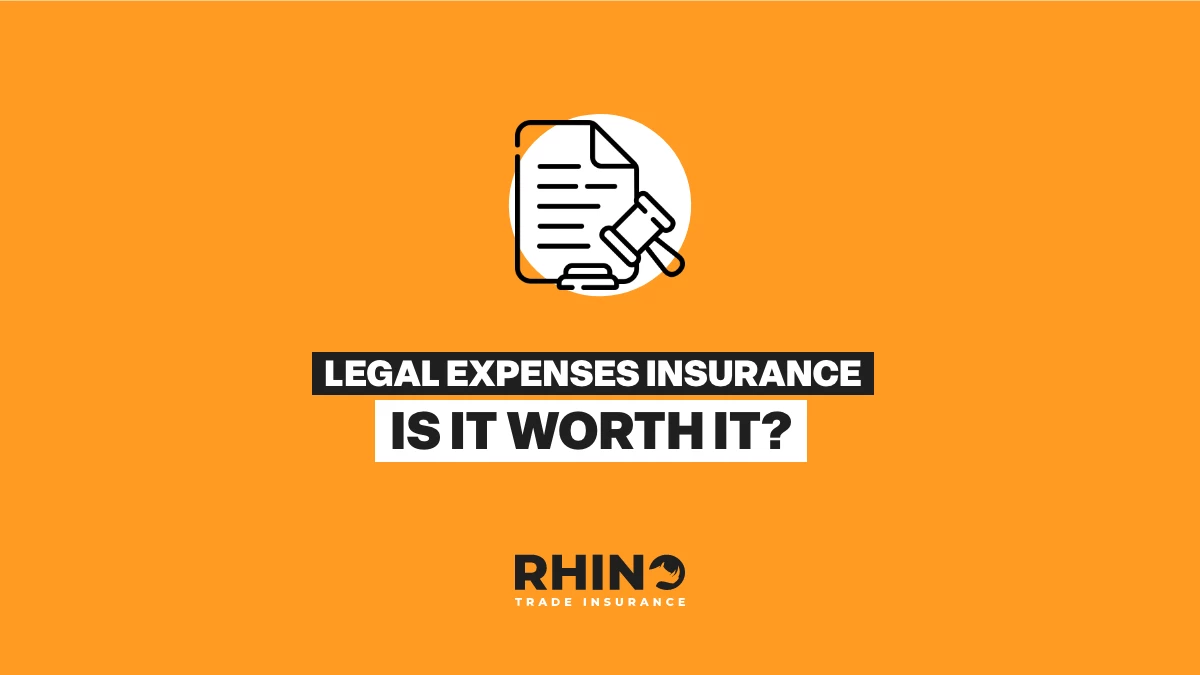
Legal Expenses Insurance – Is it Worth It?
Legal Expenses Insurance for tradespeople explained—what it covers, when you might need it, and how it protects against costly legal fees.
Falling from height is one of the top risks plaguing the trade industry. It is, without doubt, a leading cause of accidents and injuries on a building site. Of the 59,000 tradespeople who were injured on-site in 2021 (many from falls from height), 39% needed, on average, three days off, whilst 26% were off for more than a week.
With these risks to your health and your pay packet, we wanted to explore the top tips for avoiding a fall from height, what the best practices are and why having a reliable insurance policy will safeguard your business in the event of an accident.
Tradesmen and women should always ensure that adequate steps are taken to enable a safe working environment. Hazards are rife in the trade industry, and there are plenty of measures to ensure you walk off-site safe and sound.
Making sure to have the right processes in place to control any potential risk is vital. Some everyday situations you may find include:
Several risky situations can arise when working at height. Making sure your site is well-lit so that hazards can be clearly identifiable is a must. Likewise, working at height can be seriously hampered by the weather. If it's raining, ensure you have suitable walkways plotted with slip-free mats. Go above and beyond and even utilise harnesses.
If you somehow damage equipment or materials at height, you must ensure that you have strategies in place to avoid damaging the customer's property or injuring any passersby. Service, repair and store all your tools safely and properly whilst adhering to the correct health and safety requirements when working at height.
Why not read up on why you should consider Personal Accident Insurance here?
If you operate in a trade that regularly works at height, you should follow guidance and conduct risk assessments. The Work at Height Regulations 2005 shows what should be considered when planning your work and how to identify risks that could arise.
Suffering a fall from height could be due to weather, water leaks, unstable ground and more. Depending on the worker’s conditions can significantly impact the safety of the job and thus the ability to carry out the work needed.
It's worth remembering to conduct risk assessments of your equipment as well as the site you are working on. Whether you use ladders, platforms or scaffolding systems, your best bet is to ensure these pieces of equipment are in safe, working order. When checking them over, look for movements in the fixings, rusty nuts and bolts, cracks and corrosion.
Doing all of the above is worth your time and effort. Not only will it keep your business safe, it will also ensure you comply with regulations and legislation.
As a self-employed tradesperson or business owner, keeping on top of your health and safety training is invaluable. Having the proper knowledge and training in this area helps you and your workers better understand the safety procedures in the workplace and how you can better improve to fit the current industry requirements.
Knowing what risks could arise and what to do in the event of an accident or injury is a fantastic asset to hold. For example, certain elements can impact the human body differently, so in the colder months, you could experience different symptoms than a hot summer's day - especially when it’s at height.
Being on the lookout for health and safety matters arising will keep you safe, sound and secure from costly accidents.
Depending on the job project you are working on, your business may be required to wear specialist safety clothing and equipment. Consider the use of hard hats, face masks, protective glasses, harnesses, safety gloves, steel-toe caps, ear protections and more to ensure your safety and success. All it takes is one wrong slip, and you could be laid up, unpaid for a period of time.
Having the right personal protective clothing is one thing, but allowing for the general risks associated with the trades, it makes complete sense to consider a Personal Accident Insurance policy. You can add this quickly and easily to your current insurance, and it protects you from accidents that result in you becoming injured or ill and needing time off work. At Rhino, we even cover projects when you aren't at work.
The last thing you need is to take time off unpaid as an employed tradesman or woman. Ensure your finances stay in order, and explore our accident protection now.
Trades who work at height can include Plumbers, Bricklayers, Electricians, Glaziers and many more. These jobs are exposed to a whole manner of elements, from glorious sunshine to gale-force winds. With the additional safety precautions we shared in today's article, you should know how to achieve a safe and hazard-free job site.
Taking additional proactive steps, such as exploring Rhino Trade Insurance's cover options, will be your safety net if anything goes wrong on-site. Even the most astute tradesperson can have an accident on a job. No matter how many risk assessments you take or your health and safety knowledge, taking out a complete trade insurance policy will ensure your business is protected in the worst-case scenario.
Take a look at what we have available today, get a quote online in just a minute from our fast quote engine or ring the Rhino team on 0116 243 7904.
Legal Expenses Insurance for tradespeople explained—what it covers, when you might need it, and how it protects against costly legal fees.
Worried about a tax investigation? With HMRC cracking down in 2025, Tax Enquiry Insurance from Rhino gives UK tradespeople expert protection and peace of mind.
Rhino Trade Insurance CEO Troy Stevens joins industry leaders at the House of Commons to discuss the rising issue of tool theft—highlighting its impact on UK tradespeople and the importance of awareness and protection.
Tell us your trade and get a tailored insurance quote for your business in seconds
Our team of experts are available to talk to Mon-Fri 08.30-17.30 and Sat 10.00-14.00

